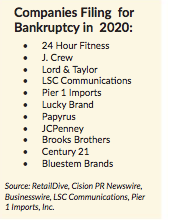Soon-to-be college graduates should weigh job market demands with their passions.
In the midst of a pandemic and economic crisis, college students wonder what the future holds, especially soon-to-be-graduates. Since the coronavirus shutdown back in March of 2020, college students have adjusted to mask wearing, virtual meetings, and canceled events.
“Graduating in a pandemic is not something that a lot of people have to go through. But it can also be an opportunity to just challenge ourselves to be better at what we do and stand out more. That way, we have a better chance of getting hired after we graduate,” says Alyssa Shoults, a visual communications major who will be graduating in May 2021.
The pandemic caused companies to file for bankruptcy and job opportunities to narrow for potential employees. In May of 2020, JCPenny filed for Chapter 11 bankruptcy, planning to close more than 150 of its more than 840 stores by the end of 2020, according to press releases from its website. JCPenney is one of many companies to file for bankruptcy.
The Centers for Disease Control’s restrictions curbed “going out,” for many Americans, leading to a decline in the leisure and hospitality industries. Jobs in the field plummeted by 7.7 million or 47%. Food services and drinking places decreased by almost three quarters in April. Other areas that employment fell in were the arts, entertainment, and recreation industry by 1.3 million within the Establishment Survey.
A study by The Conference Board found 66% of organizations surveyed decided to reduce hiring to only critical roles when the pandemic began. Businesses are going to have to make difficult decisions as to who to hire, therefore making the job market more competitive. Graduates of the classes of 2020 and 2021 will face a tough job market.
“Everything’s relative. Back in January, February, that kind of labor market would have been fantastic to graduate into,” says Philip DeCicca, professor of economics at Ball State University. DeCicca believes that graduating students will have to be thorough when it comes to their job search for these upcoming years.
In April of 2020, when schools, businesses, and life slowed down due to the spread of the virus, the number of people unemployed rose from 15.9 million to 23.1 million according to the U.S. Bureau of Labor Statistics. In April of 2019, the unemployment rate was 3.2% in Muncie, Indiana, and as of 2020, this statistic has leapt to 16.3%, more than quadruple the number from the previous year.
In April, the U.S. Bureau of Labor Statistics Household Survey showed unemployment rates rose sharply among all major fields, and the number of unemployed people who reported being on temporary layoff increased about ten-fold to 18.1 million.
The bureau’s Establishment Survey found the unemployment over-the-month decline in April was the largest since January 2011.
Professor DeCicca says the economic fallout from the pandemic will not be comparable to the Great Depression, when the unemployment rate rose as the Wall Street stock market crash lasted from 1929 to 1939, with unemployment rising to a peak of about 25%.
Audrey Guidan, another soon-to-be marketing graduate, is concerned for the labor market ahead. Guidan is concerned that she will not be able to find a job. She has recently applied to Cobalt, a record company that works with independent artists.
Audrey advises going after your desired career.
“Get into the feel of whatever it is and get your foot in the door. Practicing or getting a feel for your job so your cover letter or resume will have something related to the job you are interested in,” says Audrey.



